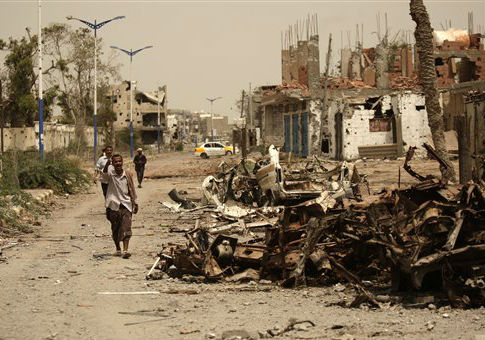A prominent al Qaeda affiliate that has plotted attacks on the U.S. homeland is quietly expanding its presence in Yemen, according to reports, a development that could fuel the terrorist group’s rivalry with the Islamic State and pose severe security threats to the West.
Al Qaeda in the Arabian Peninsula, the terrorist group’s Yemen-based affiliate, is reported on Wednesday to have seized Zinjibar and Jaar, two major cities in southern Yemen. The al Qaeda affiliate has also captured armored vehicles used by Gulf nations in Yemen’s war.
While the conflict has become one of the chief battlegrounds for a proxy war between the Sunni Muslim state of Saudi Arabia and Shiite Iran, al Qaeda has found ways to exploit the instability and gain territory. Saudi-led forces seeking to reinstall exiled Yemeni President Abdu Rabbu Mansour Hadi, and supported by the United States, have mostly focused on eliminating Iran-backed Houthi rebels, rather than al Qaeda.
The Saudi-led coalition of Arab nations expelled the Houthis from southern Yemen earlier this year but has been unable to hold the territory. As a result, al Qaeda has commandeered the key southern port cities of Aden and Al Mukalla, where it captured government buildings and freed hundreds of inmates earlier this year.
Katherine Zimmerman, an al Qaeda expert at the American Enterprise Institute, wrote in September that al Qaeda has implemented a new approach in cities such as Al Mukalla by integrating with Sunni tribal militias and local governance structures, rather than trying to impose a harsh form of Islamic law. If successful, al Qaeda’s attempt to enlarge its safe haven in Yemen "could have disastrous consequences," she said.
"[Al Qaeda in the Arabian Peninsula] AQAP was behind at least four major attempted attacks on U.S. interests outside of Yemen, and all of those occurred when the group was weaker than it is today," Zimmerman said. "AQAP is also still a key asset for the global al Qaeda network, providing overall leadership guidance, sharing expertise, and coordinating transnational attacks."
Those attempted attacks included a failed bombing on a Detroit-bound airliner in 2009 and other plots to use underwear bombs on U.S.-bound planes.
Christopher Sherwood, a Department of Defense spokesman, said that "the U.S. will continue to monitor the threat posed by Al Qaeda in the Arabian Peninsula (AQAP) and will continue to take action as necessary to disrupt continuing, imminent threats to the U.S. and its citizens."
He added that the U.S. mission against the al Qaeda affiliate was separate from the one pursued by the Saudi-led coalition in Yemen.
Ibrahim al Asiri, the affiliate’s chief bomb-maker, has also trained militants who have traveled to Syria to plot attacks against the United States and the West, Zimmerman noted. Those jihadists make up the so-called Khorasan Group.
Another concern for U.S. officials is al Qaeda’s nascent rivalry with the Islamic State terrorist group, which has launched some attacks in Yemen while mostly focusing on the maintenance of its caliphate in Iraq and Syria and the expansion of its operations in Libya. Yet after the Paris attacks by Islamic State militants, al Qaeda might be feeling the pressure to prove that it is still a potent jihadist force.
Some analysts viewed the recent attacks at a luxury hotel in Mali, claimed by an al Qaeda affiliate, as one manifestation of two groups’ battle for attention and recruits.
"Al Qaeda’s response will probably be to attempt to prove that its strategy—one that uses attacks against the West to undermine support for governments in Muslim-majority lands—remains successful," Zimmerman said. "As a result, al Qaeda is likely under pressure to conduct a spectacular attack against the West in order to demonstrate its continued relevance."
